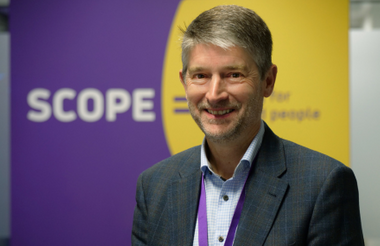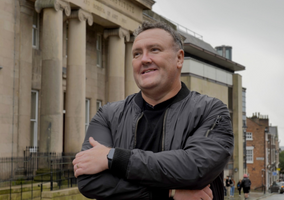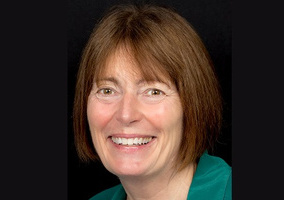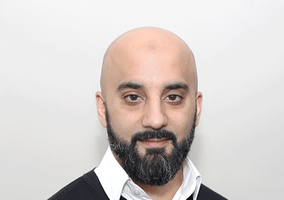Mark Hodgkinson joined Scope as chief executive at the beginning of 2019 having held “quite a broad range of roles in the commercial sector”.
Hodgkinson’s previous positions included chief executive of Virgin Money and interim CEO at Homes England, the government’s housing agency.
“I’ve always been attracted to roles where maybe there’s an opportunity to transform an organisation and deliver things in a different way,” he says.
Fragmented sector
On his move into the charity sector when he joined Scope, Hodgkinson says he “wanted to put something back into public life, something more with a social cause”.
“I didn’t have a very steep connection with disability, it was more that I wanted to bring my skills from the commercial sector into the charity sector and see if I could help it blend the two together.”
The CEO says something that “really struck me when I came from the commercial sector, is just how fragmented the charity sector is”.
“So my approach has been to positively reach out to anyone who has a similar agenda to us, or where we might be able to help them in something they’re doing.”
Hodgkinson chairs the Disability Charities Consortium, which is nine of the biggest charities in the UK.
“We’ve mainly collaborated on having a big voice to influence change, but I think there’s so many other areas of collaboration that we could explore too.
“Also I think it’s equally relevant if you’re a small disabled people’s organisation and there’s few resources in your area, but there’s something that you really care about.
“If you want to deliver change in your own community, then we as bigger charities should be helping those small organisations to make a difference.”
As for other differences between the private and charity sectors, Hodgkinson says there are “not as much as maybe some people might imagine”.
“There’s a perception if you’re in the commercial sector that maybe the charity sector is a bit slower, maybe because of the governance that goes with it.
“I think the biggest thing for me that’s been really great to see is that we can move quickly, and we can respond quickly to deliver change.
“I’d like to take my experience of the charity sector and get that more clearly understood by the broader commercial sector in terms of the potential to support that change.”
In the charity sector, he says, “most of the people that are working there are inherently motivated by what they’re doing”.
“One of the biggest challenges sometimes in the commercial sector is getting people to that place. Whereas in the charity sector, you start with many people in that place already.”
Transformational change at Scope
By the time Hodgkinson joined Scope, it had transferred most of its former regulated services to other organisations.
As a result, the charity’s income had more than halved from £94.6m in the year to March 2018 to £41.1m in 2019-20.
Hodgkinson joined as it was starting to “think more about what being a social change organisation really looked like”.
“If you’re running lots of regulated services, and all your top line income is being taken up in costs of running those services, often maybe at a slight loss, then it’s actually quite hard to deliver a really positive change, because all you’re doing is literally trying to afford the services that you’re committed to providing.
“I think the great thing about that shift for us is that you can disproportionately focus your income on the things that can make the most difference, the people you’re seeking to serve.”
Surviving the pandemic’
However, Hodgkinson’s first couple of years at Scope were focused on responding to the Covid-19 pandemic, which led to a further drop in income to £31.4m in 2020-21.
“The pandemic obviously created a lot of challenges in terms of getting income from the general public, which a big part of our income comes from. We had to shut all our shops, so we weren’t able to get any income from that. We weren’t able to raise funds on the high street, at people’s homes. Our public fundraising, we couldn’t run either. So, we had big drops in income during the pandemic.
“Those that weren’t furloughed voluntarily agreed to get their salaries to 80% of what they were before during the pandemic period. So that really helped us keep our costs under control while there was no income coming in. And we came out of that, okay.”
Scope’s income has now grown, Hodgkinson says – “it will be close to about £50m for this year”.
‘The main thing for us now is to diversify our income streams’
Scope gets most of its £44.2m income from its trading activities, with £12.8m coming from donations and legacies, according to its most recently filed accounts.
Hodgkinson says: “The main thing for us now is to diversify our income streams, so we’ve been trialling different fundraising.”
Scope’s partnership work is becoming “a more and more important part of what we do, because the only way we'll deliver the sort of change we want for disabled people is by working with partners”.
“We want partners to do things, and to make an impact themselves, like employers, but also like-minded partners will also help the charity in terms of its funding to achieve more of those things for the future.
“We’ve got some very big partnership relationships, for example, with people like Deloitte, who we work with very closely.”
Campaigning: ‘We’re not a shouty charity’
The charity recently set out its new strategy, with its three goals being to transform attitudes, see disabled people and their families have an equal standard of living as non-disabled people, and close the disibility employment gap.
Scope is now more focused on campaigning, such as on issues like the disability employment gap, “which has been very large, for a very long time”, but Hodgkinson says it does not seek to be adversarial.
“We believe that if you really want to deliver long term sustainable change, you need to influence from within. We think the right blend of approach in those partnerships is to be a critical friend.
“We very much want to start from the premise that we can work with you to achieve good outcomes. But we will also be quite challenging of you in terms of where we think you’re falling short.
“The thing that also helps us, particularly with the government, is because we engage with so many disabled people and we gather so much data and insights, it gives us a very strong influencing position in terms of being really evidence based.”
Scope is “not a shouty charity”, he says, but “by having that evidence, we can then hopefully engage with government to put the right measures in place to evidence that and make change happen”.
However, he says the changes of government leaders have “made it difficult to build that continuity”.
“I think it’s going to be quite a challenging time to get really long-term strategic change made, but we do have a very good relationship with all those different stakeholders to try and make things happen.
“We’re only going to ever achieve the scale of change we’re all looking for by being in partnership with each other. No one organisation on its own can achieve what’s required.
“It’s essential that you create a movement for change, where the different parties work together to make change happen. And there’s an alignment and focus around making that change happen.”
Co-production
About 28% of Scope’s staff are disabled people, as are half of its executive team are disabled people.
Hodgkinson says: “Co-production is at the heart of what we do at Scope. Our primary focus is on ensuring that everything we do is co-produced with disabled people.
“The network of disabled people we engage with enables us to call upon disabled people to work with us in a very collaborative way, right from the start through to the fruition of the work that we do.
“And that is a fundamental core approach that we adopted at Scope. So, our new strategy has been fully co-produced with disabled people to ensure that we’re focusing on the right things.”
Intersectionality is also “a key focus” because as a charity focused on disabled people, “we focus very much on the impacts that inequalities have on disabled people”.
Hodgkinson says a lot of problematic beliefs “are born out of either a lack of understanding or awkwardness rather than overt negative attitudes”.
“But there are obviously some really negative attitudes that we need to call out as well. So, all of these require quite strong, collaborative relationships to make that change happen.”
Related Articles












